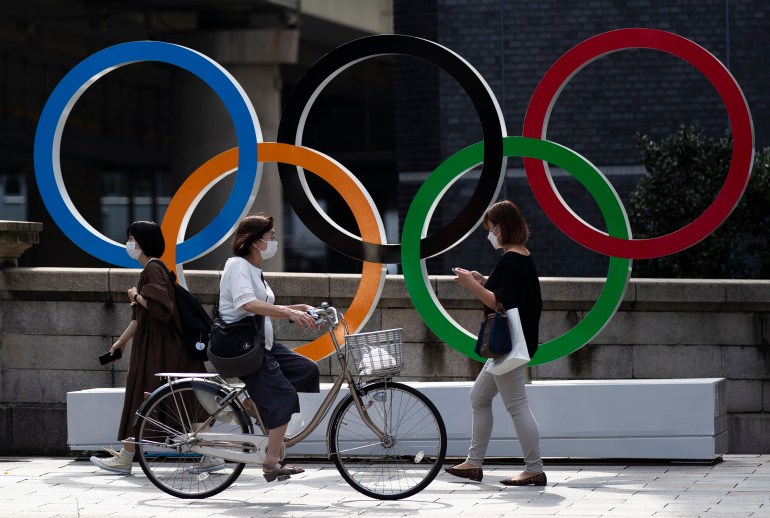Athlete, Olympic workers test positive for COVID as opening nears
Cases of a foreign athlete and five staffers mark the latest infections to emerge among people involved with the games, due to begin next week.

A foreign athlete and five Olympic workers in Japan have tested positive for COVID-19, according to the Tokyo 2020 organisers.
The cases, announced on Thursday, marked the latest infections to emerge among people involved with the Summer Games, which are due to begin next week, and have raised new concerns about the spread of coronavirus at the global sporting event.
Keep reading
list of 4 items‘Regrettable’: Tokyo Olympics to be held without spectators
Japan declares COVID emergency in Tokyo, mulls fan-free Olympics
Suga’s LDP falls short of majority in Tokyo city election
In a statement on its website, Tokyo 2020 said the six people – which included several contractors – had tested positive for the virus on July 13 and 14. It did not disclose any further details about the athlete or the staffers.
Japan’s NHK broadcaster said the athlete was observing a 14-day period of isolation and has not yet relocated to the Athlete’s Village in Tokyo, where 11,000 athletes will stay and mingle during the games that run from July 23 till August 8.
NHK also said the case marked the “first time that a foreign athlete who is staying at or was heading to a facility managed by the organising committee has been found to have the coronavirus”.
News of the latest cases came after Russia’s RIA news agency reported on Wednesday that a masseur with the Russian women’s rugby sevens team had been hospitalised after testing positive for COVID-19.
An official in the Russian team’s host town of Munakata, in western Japan, told the AFP news agency that the delegation, which included 16 athletes and 10 staff members, had landed at a Tokyo airport on July 10, and has had no close contact with local officials or residents.
The official said the rest of the Russian team was now quarantining in their accommodation, adding that if they tested negative on Thursday, they would be able to resume training as early as Friday.
COVID cluster at Olympic hotel
Also on Wednesday, a COVID-19 cluster was detected at a hotel hosting Brazilian Olympic team members. Eight staff at the hotel in Hamamatsu city, southwest of Tokyo, were found to have the virus during a routine screening. But a city official told AFP that the 31-strong Brazilian Olympic delegation was in a “bubble” at the hotel, separated from the other guests, and that none of the infected staff had come in contact with the athletes.
Separately, a city official in Kagoshima city said 21 members of the South African rugby team were also in isolation after they came in close contact with a positive case on their flight to Japan. The official said the team was due to stay in the city from Wednesday, but that plan has been halted until further advice from health authorities.
The spreading infections highlight the challenges ahead for organisers, although they note that only a handful of cases have been detected so far among more than 8,000 people who have entered Japan since July 1.
The sporting event is taking place even though the host city, Tokyo, remains under a coronavirus-related state of emergency that will run until after the games end. The Japanese capital is battling a surge in COVID-19 infections, spurred by the highly contagious Delta variant. On Wednesday, it reported 1,149 new COVID-19 cases, the highest figure since January.


‘Historic games’
The rise in cases, coupled with a sluggish vaccination campaign, has resulted in a loss of public support for the Olympics in Japan, with many fearing the games could trigger a surge of infections and a rise in new variants.
In a bid to allay those fears, Tokyo 2020 organisers have banned all spectators from all Olympic events in the capital and surrounding regions, and have imposed Olympic “bubbles” to restrict contact between visitors and the wider Japanese public. But medical experts are worried that they might not be completely tight as the movement of staff servicing the games can create opportunities for infection.
Thomas Bach, the president of the International Olympic Committee (IOC) who is in Japan for the July 23 opening ceremony, met Japanese Prime Minister Yoshihide Suga on Wednesday and reiterated a pledge to implement measures to avoid bringing “any risks to the Japanese people”.
Bach also told Suga that 85 percent of the participating athletes and 100 percent of IOC members and staff were “vaccinated or immune”. He also praised the organisers and the Japanese people for staging the event amid the pandemic, telling reporters after the meeting that “these will be historic Olympic Games … for the way how the Japanese people overcame so many challenges in the last couple of years”.
When Japan was awarded the games in 2013, they were expected to be a celebration of recovery from a deadly earthquake, tsunami and nuclear accident in 2011.
Japanese leaders had also hoped the rescheduled games this year would help mark a global victory over the coronavirus, but many countries are now struggling with new surges in infections.
An Ipsos poll of 28 countries, released on Tuesday, showed muted global interest in the Tokyo Olympics due to the concerns over COVID-19 in Japan as well as withdrawals of high-profile athletes.
The poll found a global average of 46 percent interest in the games, while in Japan, 78 percent of people were against the event going ahead.